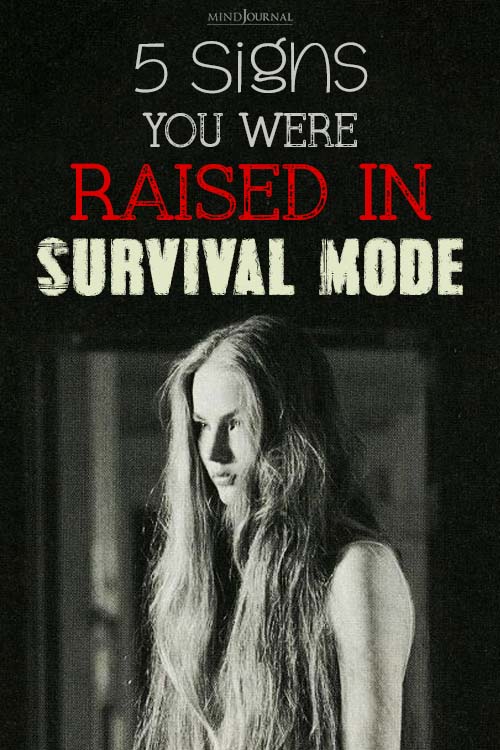Not everyone is raised in a healthy environment. Not everyone has parents who support them growing up or who pay attention to their needs. For some of us, childhood meant living in constant fear, always on edge, uncertain of what might happen next. Some of us were raised in survival mode, constantly dealing with challenging emotions like stress and anxiety because of toxic situation at home or life. This constant state of vigilance can make it difficult to develop essential life skills in a healthy way.
So, do you think you were raised in love or were you raised in survival mode. Let’s look at the signs and find out.
5 Signs You Were Raised In Survival Mode
1. You were constantly criticized
One sign you were raised in survival mode, not love, is frequent criticism. Were you always compared to your siblings, or your accomplishments were almost never celebrated?
If you grew up constantly hearing negative feedback or feeling like nothing you did was good enough, you might have been raised in survival mode. This constant criticism can keep you on edge, focusing more on avoiding mistakes than on growing and learning.

People raised in love, on the other hand, are encouraged and supported, which helps them develop confidence and healthy self-esteem. If you find yourself dealing with self-doubt or fear of failure, it might be a sign that you were raised in survival mode rather than in an environment filled with love and encouragement.
Read More: How Parents Cause Mental Health Problems In Children
2. Your parents were not physically affectionate
Some parents may be physically colder, expressing their love more through words of affirmation rather than hugs or cuddles. They might praise you, encourage you, or tell you they love you, but the lack of physical affection can still leave you feeling emotionally distant. However, there are also parents who do neither, providing little in the way of emotional support or comfort.

Growing up in survival mode in such an environment can make it tough to develop a sense of security and belonging. If your experience was one where neither physical touch nor verbal affirmations were present, it could be a sign that you were raised in survival mode.
3. You lacked a consistent caregiver
Memories are deceptive. You might remember the bad times more than the good. To get a clearer picture, let’s consider some key factors. Was your family environment stable? Were both parents actively involved in your life? If not, did you have consistent caregivers who provided support?
For children of divorced parents, having different people come in and out of their lives can create a sense of instability. This revolving door of caregivers can make it hard for a child to feel secure.

Similarly, even in homes with both parents, high levels of conflict can be just as damaging. It’s not just about having one parent or caregiver, it’s the inconsistency, confusion, and unpredictability that can deeply affect a child’s development.
4. You were neglected emotionally
When we hear the word “neglect,” our minds often jump to physical issues like a lack of food or a safe place to live. However, emotional neglect can be just as damaging, even if it’s less visible.
It encompasses a range of experiences, such as being exposed to domestic violence or substance abuse without the emotional support you need from caregivers. This might include missing out on affection, validation, or guidance, all of which are crucial for healthy emotional development.

The impact of these experiences can be profound, leading to deep emotional wounds that undermine your sense of safety, self-worth, and ability to build healthy relationships.
As a result, you may find yourself living in survival mode, navigating life with heightened stress and anxiety. Often, this neglect isn’t intentional, but its effects on mental health can be long-lasting and significant.
Read More: How Children Of Obsessed Parents End Up Feeling Lost and Empty
5. You were subjected to physical and emotional abuse
Ideally, parents are supposed to offer you unconditional love and support. While it’s normal for them to get frustrated or raise their voices occasionally, abuse crosses a serious boundary. No one should have to live in constant fear of their parents.

Research shows that emotional abuse can lead to long-term effects such as depression, self-destructive behaviors, anxiety, feelings of isolation and stigma, poor self-esteem, difficulty trusting others, and a higher likelihood of revictimization and substance abuse.
If you experienced regular abuse during childhood—whether sexual, physical, emotional, or verbal—it’s highly probable that you grew up in a state of survival mode. This survival mindset can linger, impacting your life well into adulthood.
Final Thoughts
If you were raised in survival mode, you might find it challenging to rely on others. Seeking therapy could be a valuable step in understanding and processing the effects of your upbringing. A therapist can help address issues like anxiety or PTSD that may have resulted from your childhood experiences. If you’re ready to seek help, we wish you the best and hope you find the support you need.
Read More: 8 Ways To Slow Down and Connect With Your Children At Home
Frequently Asked Questions (FAQs):
What does it mean to be raised in survival mode?
Being raised in survival mode means growing up in an environment where basic emotional needs are not met, leading to a constant state of stress and anxiety.
Can being raised in survival mode affect my adult relationships?
Yes, it can lead to challenges in forming and maintaining healthy relationships, as you may struggle with trust and intimacy.
Is it possible to heal from a survival mode upbringing?
Yes, healing is possible with the right support, such as therapy, self-reflection, and building healthy relationships.










Leave a Reply